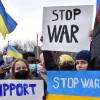The White House confirmed plans today to join Europe in directly sanctioning Russian President Vladimir Putin over the invasion of Ukraine. That's one day after President Joe Biden announced a first round of sanctions against Russia as troops closed in on Kyiv. Massachusetts Rep. Bill Keating wants to go a step farther, introducing bipartisan legislation that would also sanction members of the Russian parliament.
Keating is the chair of the House Foreign Affairs Subcommittee on Europe Energy, the Environment and Cyber, and he recently met with Ukraine President Volodymyr Zelenskyy and Kyiv Mayor Vitali Klitschko at the Munich Security Conference. He joined Boston Public Radio to discuss the United States' role in the developing Russian invasion of Ukraine.
Keating believes the deployment of U.S. troops would be justified only if Russia were to invade a NATO member nation. In other words, he said sanctions are currently our best option.
“We can't commit even if we wanted to,” Keating said. “It'd be like putting our own troops into a meat grinder, frankly. And Putin's got the upper hand in the short run here with his military power.”
More Politics
Keating said that in addition to giving weapons to Ukraine, the U.S. is promising to replace weapons lent to Ukraine by U.S. allies and will send supplies to support refugees who flee to Poland. Meanwhile, countries, including Japan, have stopped exports of key goods to Russia.
Keating does not think these actions will deter Putin.
“The sanctions aren't stopping Putin from his military effort and from doing what he's doing,” he said. “I never thought they would.”
The congressman said that the economic effects of sanctions take time, and that he does not think they will work unless they affect Putin directly, which the White House confirmed it would do today, joining other European countries in direct sanctions on him and Russian Foreign Minister Sergei Lavrov.
“The sanctions on a timeline are going to take effect and pressure Russia and make it a pariah, a third-rate country, but that takes time,” Keating said. “He [Putin] doesn't seem to care that he's doing that to his own country and his own people.”
Keating wants to go a step further, pushing for bipartisan legislation that would sanction more than 300 of Russia’s parliament members.
“I did this in coordination with the European parliamentarians, they are doing the same thing,” he said. “These are Russian elites, too, so it's another way to pressure them.”
The congressman also said he thinks that a cyber attack is “likely,” but that the U.S. is prepared.
“I believe that this is the type of moment when we will actually use our offensive cyber power back, and I think that's going to give Putin pause,” he said. “Our cyber power is enormous. It's the best in the world, it’s the most powerful in the world.”
Still, Putin’s actions, which Keating described as “irrational,” worries him. He is concerned about the Russian president's threat to use nuclear weapons.
Keating is also concerned about aftershock effects on other democratic countries. With rising gas prices, the congressman thinks Putin may rely on voters in European countries and the U.S. getting fed up with the economic impact of the invasion and pressuring legislators to ease up on Russia.
“Putin is counting on this,” he said. “Those things will wear down people and they'll say to themselves, ‘You know, I'm sorry about these scenes I'm seeing from some country. I don't even know where it is on the map, but I don't want to pay five bucks a gallon of gas.’”
Keating emphasized that while support for Ukraine is strong right now, the coming months will be crucial.
“It's about values,” he said. “This is a turning point between authoritarianism and democracy. Democracy is fragile and it's under attack, and it's even being backslidden here in this country right now. So this is our moment. Will we run the course? Will we stay the course?”










